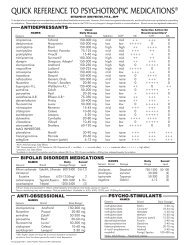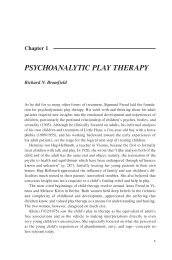IRAQ WAR CLINICIAN GUIDE
Iraq War Clinician's Guide - Network Of Care
Iraq War Clinician's Guide - Network Of Care
Create successful ePaper yourself
Turn your PDF publications into a flip-book with our unique Google optimized e-Paper software.
Iraq War Clinician Guide 163 Appendix C<br />
p-<br />
150 ?ERENCEM.KEANE 0 nl<br />
sultation and frequent debriefmgs are a necessity in helping clinicians to<br />
cope with their own reactions to trauma-related therapy.<br />
DEALING WITH MANAGED CARE<br />
AND ACCOUNTABILITY<br />
We now live in an age of managed care. Themanaged care reality affects<br />
many (if not most) cliniciansand holds significant implications for clinical<br />
practice. Thevirtue of the managed weenvironmentis that it requiresthat<br />
patientsbe provided with treatment servicesthat are known to be effective<br />
(ie., empirically validated trealments). Additionally this environment requires<br />
that patients not be kept in treatment longer thannecessary. Therefore,<br />
it is important that clinicians be competent in brief or time-limited<br />
therapy and for them to engage in ongoing assessmentof apatient's status.<br />
The demands of managed care alsorequire that aspecifiedtreatment result<br />
in improvement for aparticular patient within a reasonableperiod of time<br />
or the treatment must be changed. In the age of managed care, more than<br />
ever before, clinicians are required to demonstratequality services that are<br />
also cost-effective. Clinicians must justdy that their services are effective<br />
and that these services enhance clinical outcomes. Apriority is placed on<br />
effective treatments that can be provided in an efficientmanner with high<br />
levels of patient satisfaction.<br />
Exposure-based treatments meet many of the demands of managed<br />
care. These treatments have been empirically validated and shown to be<br />
effective in reducing PTSD symptoms, as well assymptomscfmany other<br />
psychological disorders (see Keane, 1998, for a review). The empirically<br />
validatednature of the treatment appealstomanaged care companiesand<br />
can aid clinicians in defending their treatment decisions. Additionally the<br />
orientation of most exposure-based treatments is brief, symptom-focused,<br />
and designed to improve functioning. These treatments can be effective<br />
within the constraints of the time-limited therapy model required by managed<br />
care companies. Lange et a/. (1988)reported that 63% of health maintenance<br />
organizations (HMOs) have a 2@visit maximum for outpatient<br />
mental health services. In most cases of noncomplicated PTSD, 20 visits<br />
should be sufficient to complete aprogram of exposuretherapy. We believe<br />
that effective assessment and treatment of PrSD requires 12 sessions at a<br />
minimum. However, many patients will begin to exhibit improvements in<br />
symptomatology and functioning after a few exposure sessions, providing<br />
important data that clinicians can use to justify continued treatment, if<br />
necessq.<br />
- -- -<br />
DEPARTMENT OF VETERANS AFFAIRS<br />
NATIONAL CENTER FOR PTSD




